The misinformation and running myths that are often still perpetuated by runners, media and even doctors are doing a big disservice to our sport. It’s keeping away people who might just need the many benefits running provides from a mood boost to preventing cognitive decline!
In Victorian times people believed that sports like running were bad for women because “excessive jumping will cause the uterus to be dislodged”.
This seems laughable to most of us now, but this one of many running myths continued to circulate even as Kathryn Switzer was running the 1967 marathon. In fact, I had a runner tell me just recently that her OBGYN wasn’t convinced running was ok for women…yikes.
With that in mind let’s break down some of these myths with real facts and data.
8 Biggest Running Myths
Now is the time to put eight other long running myths (pun intended) to rest and move on to more challenging questions like, why are Trix only for kids?
Myth 1: Running is Bad for Your Knees
Since 45% of all running injuries involve knee pain the belief persists that running is inherently bad for the knees. However, the majority of knee related issues are a result of weak hips, tight muscles and overuse.
Researchers, such as Dr. Michelle Wolcott from the University Of Colorado School Of Medicine, note numerous studies show that weight-bearing exercises, like running, help prevent osteoporosis and osteoarthritis.
Repetitive motion is required for the cartilage around the knee to receive oxygen and nutrients; running is one way to provide this stimulus.
AND a more recent study followed 80 people through marathon training and found that their bones and joints around the knee actually became stronger!
Jonathan Chang, an orthopedic surgeon in Alhambra, Calif., says that exercise appears to stimulate cartilage to repair to minor damage. It could be that the impact of body weight when the foot hits the ground increases production of certain proteins in the cartilage that make it stronger, he says.
 Myth 2: Carbo-Loading is Required for Peak Performance
Myth 2: Carbo-Loading is Required for Peak Performance
I just recently shared with you the 7 mistakes most runners make when it comes to carbo-loading, but this myth couldn’t be left off the list!
The original theory of carbohydrate loading developed from a 1967 military study of recruits under exhausting exercise conditions whose diets were first depleted then restocked with carbohydrates.
In such extreme circumstances, it is no surprise to most of us that they began to perform better after receiving increased carbohydrates.
Since then additional studies have shown that after a week of carbohydrate loading the amount of glycogen in muscles was no greater than at the beginning of the week.
Put more bluntly, athletes who spent a week adding bagels and pasta to their daily regimen received no performance gains. In fact, nutritionists suggest that the over indulgence in carbs may make athletes feel more lethargic and bloated leading up to race day.
Instead, you only need a day or two focused on high carbohydrates. And only for half marathon and longer distances.
Myth 3: Side Stitches Are Because You’re Out of Shape
A side stitch while running can certainly be caused by shallow breathing which means you’re not getting enough oxygen to the muscles resulting in muscle cramps.
However, it can also be a result of eating a large meal prior to your run which means the body is busy trying to digest food and pressing against the diaphragm.
It can also result from a sudden spike in blood sugar from that gel or super sugary drink you think you need….but don’t. It slows the stomach from emptying causing a bloated feeling after running and thus shrink the space around your diaphragm causing the painful side stitch.
Dr Darren Morton has done extensive studies on this and the short story is a side stitch is “an irritation of the membrane lining the abdominal cavity and that what (and when) you eat and drink before you get active can raise or lower the odds of having one.”
Running is bad for your knees and other myths debunked! #fitness via @runtothefinish Click To TweetMyth 4: Barefoot Running Reduces Injuries
Thanks to Born to Run, barefoot and zero drop shoes became a new trend as runners are always ready to try the next for injury prevention.
The concept behind the barefoot style of running is that without the traditional cushioned shoe, the body naturally lands with the foot under the hip preventing over striding and softening the landing.
At first glance this makes sense.
But the years that followed showed a sharp increase in runners with shin splints, ankle injuries and a whole lot more because simply reducing your shoe size isn’t the only thing required to improve your running form.
Checkout these 4 simple form tips >>
The American College of Sports Medicine also released a new study showing that changing stride may reduce knee impact, but create stress in other areas such as the foot and ankle. Runners who change their stride without understanding the way it will affect their muscle usage are likely to create new injuries.
As with ALL things, some runners feel better barefoot, but it’s not for everyone. You have to find what feels best for your running.
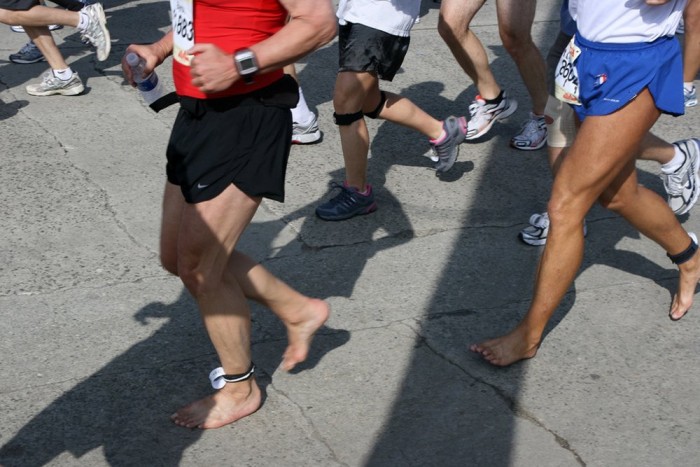
Myth 5: Every Runner Gets Injured
Hang around a group of runners long enough and you’ll hear about an injury each of them as sustained. Worn a bit like a badge of honor these discussions perpetuate the idea that running hurts and always leads to injury.
Michael Conlon, owner and Physical Therapist of Finish Line PT, says most runners experience injuries because they don’t do any preventative work.
Instead of learning about their weaknesses or spending a few minutes each day on exercises that will improve stability, runners focus solely on the act of running as a means to improve.
Pre-hab is the new black!
Stop waiting until you end up at the Physical Therapists in pain and spend a few minutes each day on a couple moves that will keep your hips strong and your stride right.
These are the moves that have kept my IT Band happy for many years now! And we have an entire pre-hab course to keep you running injury free for years and years!!
Myth 6: Everyone Hits The Wall
“The Wall” has become a loaded term in running, just the mention of it causes us to cringe and then to ponder what we’ll do when it happens because it has to happen, right?
The “wall” is loosely defined as the point in the marathon when everything goes from “I can’t believe I’m going to do this” to “I can’t do this”.
The body has run out of glycogen and every step begins to feel like a cement block has been tied to your leg and is also known as bonking.
Hitting the wall is the result of either pushing beyond your limits and/or running out of fuel.
Training the body to use fat for fuel is the first step, completing a full training cycle with a coach is another and learning when to take in carbs during the race is the final piece.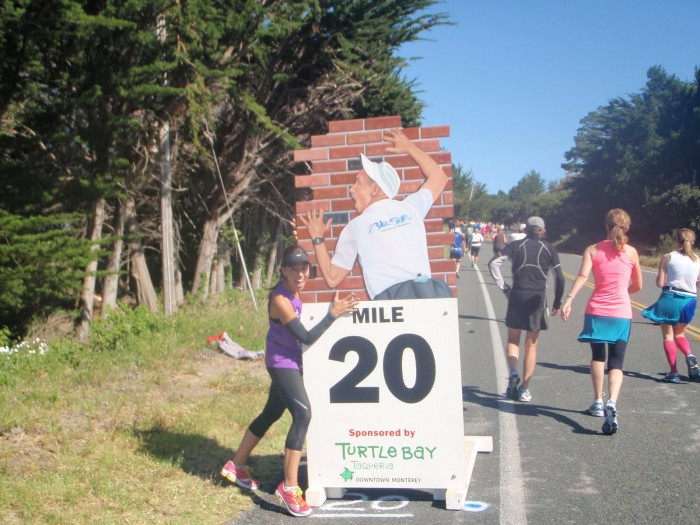
Myth 7: There is a Perfect Diet
All right maybe this isn’t just running myth related, it’s everyone who thinks that going Vegan makes for a longer lasting runner or going Keto makes you leaner and faster.
Matt Fitzgerald did an amazing job of breaking this down in his book Diet Cults (read review)
“Science has established quite definitively that humans are able to thrive equally well on a variety of diets.”
The key is trying different things to find out what works for you! It’s why I did a 60 day Vegan lifestyle, it’s why I’ve eliminated and brought back certain foods. Once you figure our your best diet, it improves energy, you enjoy food more and eh hem avoid runner’s trots.
Checkout these tips for an endurance diet that will support your running >>
Myth 8: There is a Perfect Running Shoe
This was best answered by the experts at Runner’s World-
“Running shoes are designed for different types of people, strides, feet, and types of running. What may be my “perfect” shoe (itself a myth, we’ll get to that latter), may be completely wrong for you. The very characteristics I like in a shoe may make it uncomfortable for you.
When Runner’s World gives a shoe an award like “Editor’s Choice” all it means is that it works well for what it is designed to do and was rated highly by many testers.”
Checkout this comparison of maximal and minimal shoes to see what might be right for you.
What questions do you frequently answer about running?
Any of these running myths that surprised you?
Other ways to connect with Amanda
Instagram Daily Fun: RunToTheFinish
Facebook Community Chatter: RunToTheFinish
Sign Up to Receive a Weekly Newsletter with Top Running Tips and Laughs
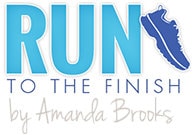
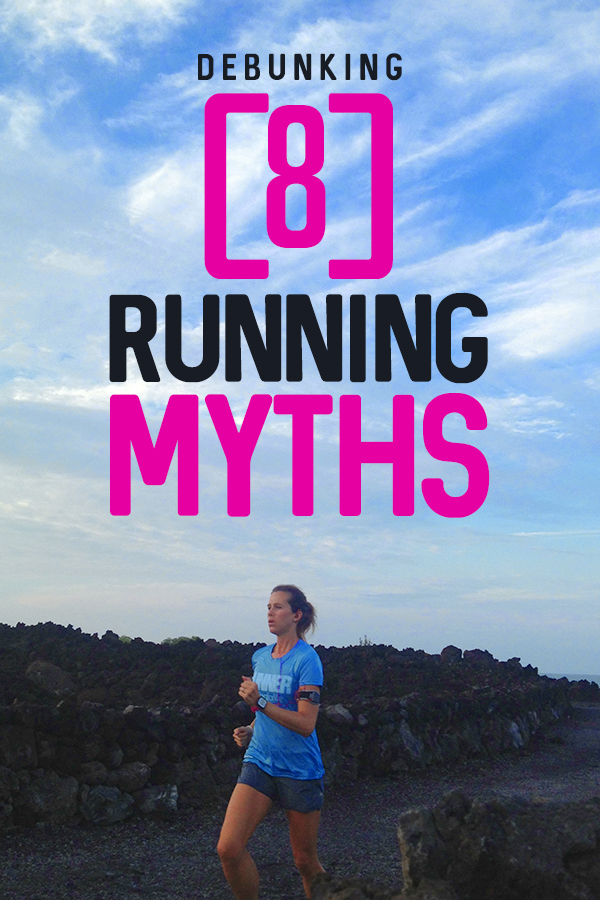
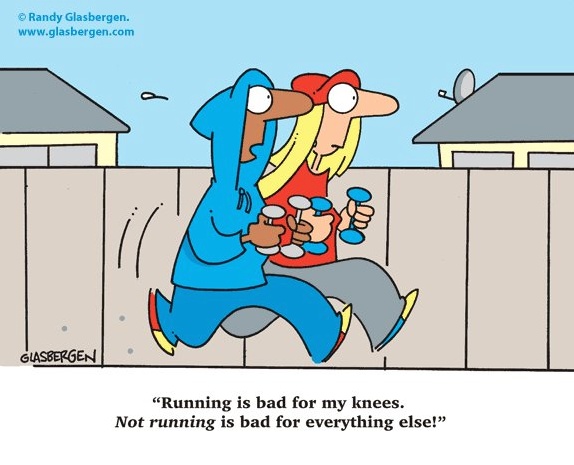 Myth 2: Carbo-Loading is Required for Peak Performance
Myth 2: Carbo-Loading is Required for Peak Performance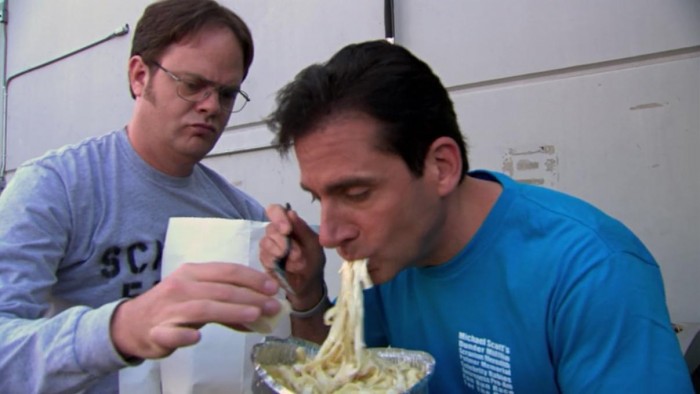

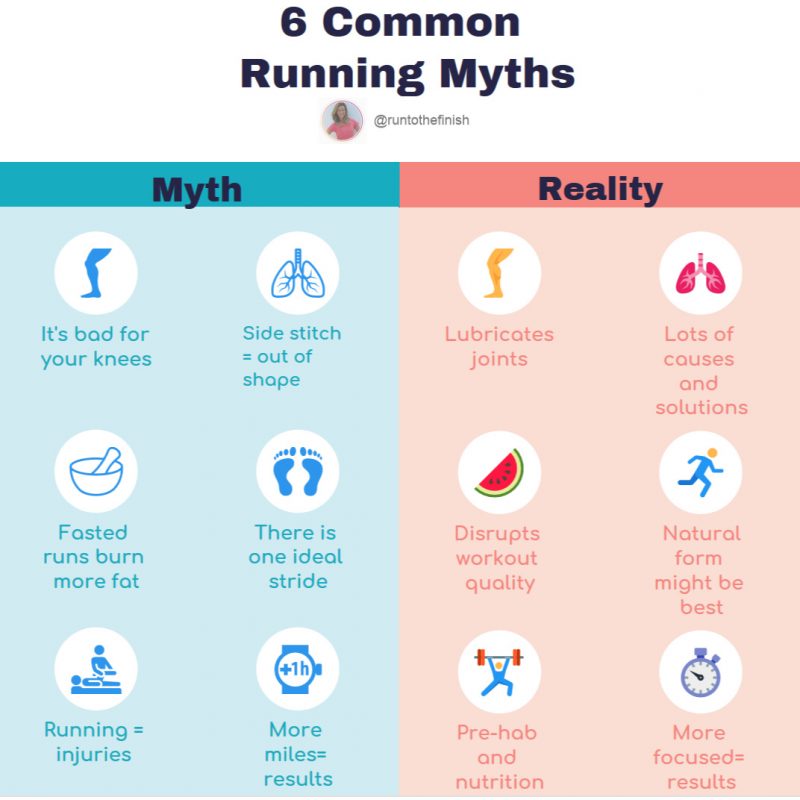

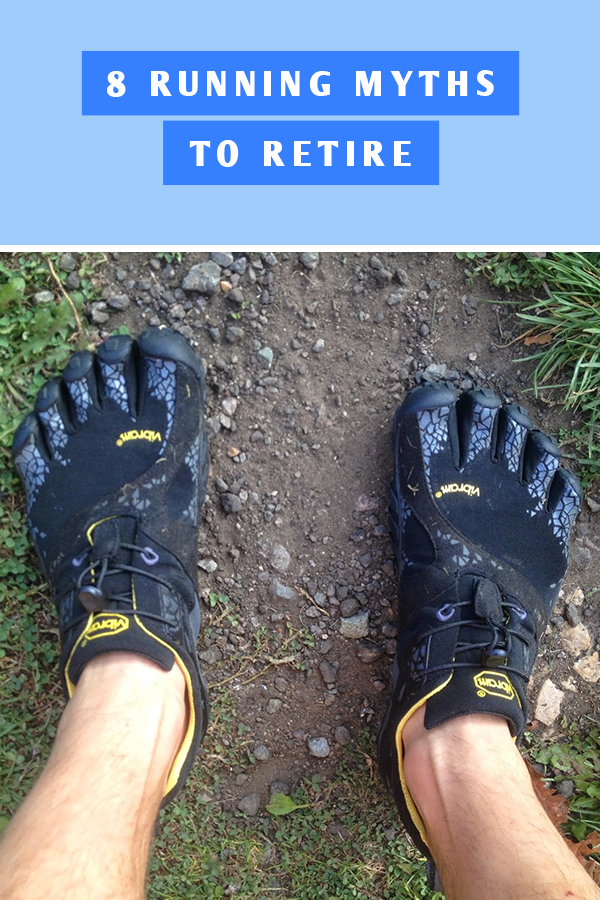
 7 Best Treadmill Workouts (Adaptable For Your Fitness)
7 Best Treadmill Workouts (Adaptable For Your Fitness)

fairytalesandfitness
These are so true! I hate when people say that running ruins your knees. That is a bad assumption. Those people are usually not runners. And if they are, they may not be doing other things right such as stretching and recovering right.
wendy
I hear the knees comment all the time! My response is always that my knees are fine but my feet really bother me!
My recent post Big Sur Marathon Training Week 6
t20 world cup 2016 India
Hello! I could have sworn I’ve visited this site before but after looking at many
of the articles I realized it’s new to me. Regardless, I’m certainly pleased I came across
it and I’ll be book-marking it and checking back frequently!
Gianna @ Run, Lift, Repeat
All of these are so great. I get so tired of hearing how running will ruin your knees. And when I went to PT to have my hamstring pain assessed they mentioned I have strong knees so there is that.
Colleen @ CSmith Run
I'll probably still use carbo-loading as an excuse to load up on bagels and pasta leading up to races :) And obviously re-hydrate with some beer.
My recent post Highest Mileage Week Yet! (51.95 Miles)
Nicole
Great list! I hate the knee comment- it drives me nuts!
I am totally the one who over carbo loads and then feels bogged down and heavy! I even know I shouldn’t and still do it. I think part of it is that I also try to avoid high fiber foods and end up eating more sugary carbs because of it and I’m not used to those foods and it makes me feed bad.
thisrunnersrecipes
The perfect diet for runners myth irritates me – there really isn't one perfect diet, especially because people respond to foods differently.
My recent post Mile Markers: Recovery Week
Linz
YES YES YES! couldn't agree more! great article, amanda! :)
My recent post the best
organicsandra
I love this. So many of these myths are things you hear all the time. And there is definitely no perfect shoe!
My recent post Thoughts about running the Boston Marathon again.
dramrita
Running regularly helped me build up my stamina.Love how you have broken down the myths
Melianna
Love this post! Fun AND TRUE.
Ann
Thank you for such an informative post! I learned so much new info. Your blog is amazing, and I appreciate all the hard work that goes into it.